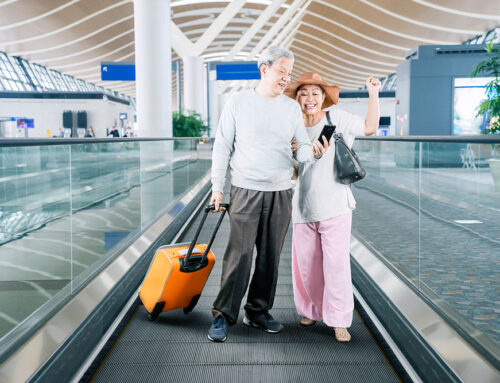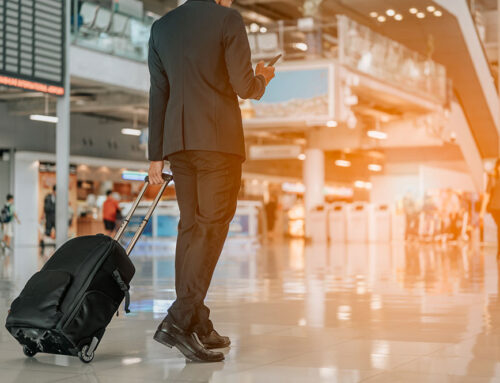“Wherever I go, I act like I belong. People don’t question me. If you apply that to your life, when you’re traveling, it changes everything.” In our interview with Craig Carter, the founder and developer of CIPHER Methodology, we discuss travel security and connections you can make with others while away from home. In addition to a travel safety app like FoneTrac, your overall attitude when traveling can help keep you safe.
“What we think about and what we focus on is what we put out into the world.” Those words, strategically applied, can change everything. CIPHER, as Carter explains it, empowers clients to exceed limitations, and it can help travelers in any industry elevate their experience. Carter is also a frequent traveler for his company, K’Alma Spa Concepts & Management, which manages international luxury hotel spas.
Tell us a little bit about CIPHER.
 Particularly for clients in the Hospitality industry, the customer experience is significant. It’s what drives good reviews, repeat business and growth. The principle behind CIPHER is this: Connect. Interrupt patterns to influence Performance. Have an Experience that drives a Result. That’s how I get my clients exceeding their limitations…changing the entire experience, the one that starts with each connection.
Particularly for clients in the Hospitality industry, the customer experience is significant. It’s what drives good reviews, repeat business and growth. The principle behind CIPHER is this: Connect. Interrupt patterns to influence Performance. Have an Experience that drives a Result. That’s how I get my clients exceeding their limitations…changing the entire experience, the one that starts with each connection.
That sounds like a great idea for businesses. But how does that apply to travelers?
Going back to creating a connection…we have the ability to do that wherever we go. Those connections when you go to a foreign city, for example, can be the difference between you wandering around on the streets or behaving as if you belong there. You are in control of one thing, and that’s yourself. How you present yourself to the world creates positive experiences for others, and that’s how you can get anything you want.
So practically speaking, how do we do that?
Start by humanizing yourself to strangers if you want to create a positive experience. If you are traveling in a foreign country, go up to someone in your hotel, on the street, at a business…create a connection first. Shake hands, make eye contact, share an experience, try to speak their language…do that before you ask them for directions. Instead of focusing on the thing you need- directions to a hotel, a restaurant, a taxi…focus on the people in front of you in the moment and consider them as part of your experience.
An example: I was traveling in Rome a few years ago with my wife and one of my kids. I don’t speak Italian, but I learned a few basic phrases. Whenever we would go into our hotel or a restaurant, I would try to speak those phrases, however poorly, with a lot of enthusiasm. I even learned how to say “I don’t speak Italian” in Italian, which made the whole thing even funnier. And you know what? Wherever I tried to interact with the people around me, my enthusiasm was obvious. People would laugh, shake my hand, hug me for trying…and we got treated really, really well everywhere we went. One connection led to another…that’s what takes you from tourist to traveler to guest.
So, you’re saying that we have the ability to shape our own experiences…even down to the kind of service we receive?
Absolutely. What we think and what we focus on is what we put out into the world. If you’re focused on the negative, like “I hate airports, I hate standing in line, I am tired of staying in hotels,” that’s the energy you radiate and present to those around you. That shapes your whole experience. When you present yourself positively- in the same airport, same hotel- can change the entire nature of the experience. Even your body language and facial expressions when you’re in the wrong state of mind can have a strong impact on the reception you get. Think about the person in line in front of you who is complaining his way through the wait. He or she demonstrates impatience and irritability…which makes its way up to the reception desk and the people behind it. Wouldn’t you rather be known as the guest who is always nice and kind?
We do a lot of work around travel safety…how does that factor into the experience?
Most people see “us and them” when they travel, and particularly with hospitality staff, there is a mindset that they are there to serve us. You find the commonalities…notice them, remark on them…and there’s the connection you can make. THEY have the same issues and problems that we do globally, and people sometimes forget that. Did you forget your contact lens solution? Find someone who wears glasses who might related to you, ask for help with little things…and if you end up with a larger emergency, they already know and want to help you.
Those connections can also help you navigate cities with the benefit of “insider” viewpoint. Once I make some connections, I will ask for recommendations, places to go, even any places to avoid. So, when I go somewhere, I’ve got a sense of where I am and I’m more confident in my movements. In Venice, for example, where there is a heavy tourist population, my approach made me less of a target. If you move with a sense of purpose, whatever space you are in, and stay mindful of what’s around, you give off the impression that you “own” whatever space you’re in. That commands respect, especially when you make eye contact, smile…make the effort to treat everyone with kindness and respect.
FoneTrac Travel Safety App Solution
If you’re looking for a travel safety app that offers instant access to a 24/7 team of security experts, look no further than FoneTrac. With FoneTrac, you can check-in or send panic alerts at the touch of a button…anywhere in the world. We have decades of experience in the security industry and partner with UnitedHealthcare Global to provide our clients with top-notch service. FoneTrac is the ideal business travel security app, travel safety app and iPhone / Android companion for your travel needs. Contact us today!
Join us again next week for Part 2 of our exclusive interview with Craig Carter, Vice-President of Strategic Development, K’Alma Spa Concepts & Management.


